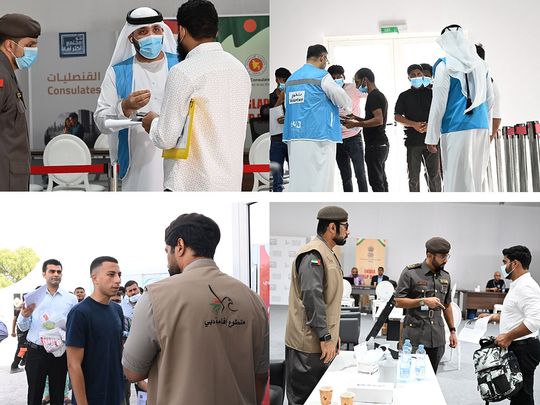
Dubai: The amnesty programme in the UAE – which benefits people living illegally in the country – is about to wrap up tomorrow, and officials have already clarified that the duration for the amnesty will not be extended.
The amnesty, which started on September 1 and ends on October 31, 2024, has seen tens of thousands of people regularise their visa status or leave the country. The Federal Authority for Identity, Citizenship, Customs and Port Security (ICP) has also announced several additional facilities for people in the UAE to encourage them to take advantage of the amnesty.
What is the amnesty?
The amnesty is a grace period within which people who are living in the UAE on expired or cancelled visas can either request for their visa status to be corrected, or leave the UAE on an exit permit. The amnesty was announced by the ICP in August this year, and runs for a period of two months, from September 1 to October 31, 2024.
Apart from allowing illegal residents to regularise their status, the ICP and other authorities have also made several announcements aimed at encouraging people to take advantage of the grace period.
1. Women can sponsor their children
On October 12, the ICP announced that if the head of a family violates the residency laws, he can transfer the residency of their children to the mother, provided she is employed and holds a valid residency.
The ICP also confirmed that if the head of the family — a residency violator — wishes to leave the country along with his family, he must apply for exit permits enabling the entire family to depart without fines or fees during the amnesty grace period. If the father is a residency violator and his children want to regularise their status, they may do so through the mother if she is employed.
2. No administrative fees
At the time of announcing the amnesty, ICP had also stated that people who want to rectify their immigration status will benefit from the waiver of different types of fees and no travel ban will be levied on people who choose to leave the country.
Some of the fines that amnesty seekers get waived are:
- Administrative fines resulting from staying in the country illegally.
- Establishment card fines.
- Identity card fines.
- Violation of not providing the Ministry of Human Resources and Emiratisation (MOHRE) with an employment contract.
- Violation of not providing MOHRE with an employment contract renewal.
3. No health insurance late fees
With health insurance being mandatory in Abu Dhabi, those who overstayed their visa also faced the possibility of fines being levied for not renewing their health insurance. However, at the start of the amnesty, Abu Dhabi’s Department of Health (DoH) also announced a waiver on these fines.
4. Extension of exit permit duration
Those who want to leave the UAE get an exit permit, through which they can go back to their home country. While earlier the validity of the exit permit was set at 14 days, in September, the ICP announced that the permit would be valid until the end of October, when the amnesty period ends.
5. Passport validity period reduced
Amnesty seekers also do not need to have to have a validity of six months on their passports any longer. In September, ICP announced its decision to reduce the passport validity period to one month, to facilitate the process for those seeking amnesty.
Previously, violators with passports valid for less than six months had to first renew their passport before applying for the amnesty.
6. New job offers made easy
Amnesty seekers are also getting massive support from the UAE community, with businesses setting up stalls at the Al Awir centre or even at the Indian Consulate.
How to apply for amnesty
If you, too, want to take advantage of the amnesty to regularise your residency, you can reach out to the ICP through the following channels:
- ICP call centre – 600 522222
- Live chat – icp.gov.ae
- Amer call centre (for Dubai) – 800 5111
- MOHRE call centre – 600590000
- Any of the social media channels of the ICP or the General Directorate of Residency and Foreigners Affairs Dubai (GDRFAD).
The story was first published on October 14, 2024 and has been updated since.











